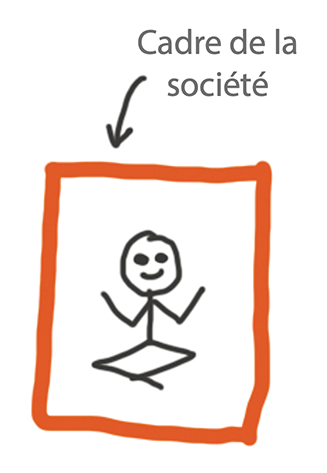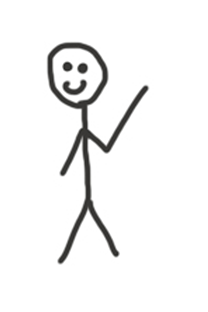Si vous vous questionnez sur votre haut potentiel intellectuel et vous cherchez à comprendre comment vous fonctionnez, rester bien sur cet article. On va voir ensemble les grands principes évoqués dans le livre « Trop Intelligent pour Être Heureux » et qui répondront à vos questions principales.
C’est en apprenant en continu sur ce fonctionnement particulier que de nombreux adultes à haut potentiel avec qui je suis en contact arrivent à bien vivre cette douance. N’oubliez pas d’aller jeter un coup d’œil aux autres livres sur le HPI !
Je m’appelle Paul, et mon haut potentiel a été détecté il y a plus de dix ans maintenant. Aujourd’hui je partage ce que j’ai appris pour aider les petits nouveaux.
NB : cet article est la transcription de la vidéo ci-dessus.
Présentation du livre et de l’autrice
Alors avant de commencer je voulais vous donner quelques infos sur le livre en lui-même et sur Jeanne Siaud-Facchin pour se remettre dans le contexte. Donc c’est un bouquin qui a été publié en 2008 et qui a été vendu à plus de 500 000 exemplaires. C’est quelque chose d’énorme !
De son côté, Jeanne Siaud-Facchin a créé (entre autres) les centres Cogito’Z à partir de 2003. C’étaient les premiers centres français de diagnostic et de prise en charge des troubles des apprentissages scolaires. Aujourd’hui, elle a transformé ça en véritable franchise. C’est une business woman !
En 2011 elle a aussi créé Zebra Alternative qui est une association marseillaise pour les enfants surdoués qui ne sont pas à l’aise dans le cursus scolaire classique. J’en avais déjà parlé dans mon article sur les associations pour enfants précoces.

Sinon, de manière générale, c’est une psychologue spécialisée dans le HPI. Elle ne voit donc que les personnes à haut potentiel (les enfants précoces principalement mais aussi certains adultes zèbres) qui ont des difficultés et c’est pour ça que dans son bouquin elle s’attarde pas mal sur les difficultés des HPI. C’est tout simplement parce qu’elle n’est pas en contact avec les personnes pour qui tout va bien parce qu’ils vont pas consulter.
La dénomination du surdoué
Alors elle commence son livre en parlant de tous les mots que l’on retrouve pour parler des personnes HP. Il y a « haut potentiel », « surdoué », « précoce », etc. Mais globalement elle ne les aime pas trop ces mots. Ils impliquent une notion de supériorité. On est soit haut potentiel (on a un grand potentiel, plus que les autres), soit surdoué (on est plus doué que les autres), soit précoce (on est en avance sur les autres). Donc cette notion de supériorité et d’avance ne lui plait pas parce que, au final, être HP, surdoué ou précoce c’est juste avoir un fonctionnement différent. Ce n’est ni au-dessus ni en dessous. C’est différent.
C’est pour ça qu’elle a décidé de les appeler les zèbres. Vous êtes certainement tombé sur ce terme de zèbre un peu partout parce qu’il est très répandu maintenant. Mais c’est elle qui l’a créé.

Pourquoi « zèbre » ? Elle explique par le fait que le zèbre est le seul équidé que l’Homme n’a pas réussi à domestiquer. Et dans la savane, on le remarque facilement avec ses rayures, mais en même temps ces mêmes rayures lui permettent de passer inaperçu. Il se fond dans la masse avec toutes les herbes dans la savane. Donc le zèbre est un animal qui est différent tout en étant pareil. Être zèbre, c’est avoir une personnalité de zèbre, c’est se sentir différent tout en se fondant dans la masse.
D’ailleurs, c’est le « z » de « zèbre » qui a donné le « z » de « Cogito’Z ».
Le développement de l’enfant précoce à l’adulte zèbre
Une grosse partie de ce livre est consacrée au développement de la personnalité et de la confiance en soi de la période bébé jusqu’à la phase adulte. J’avais déjà traité toute cette partie sur l’enfance et l’adolescence du zèbre.
Verdict : haut potentiel. Et après ?
Par contre, dans cette vidéo-là, je n’avais pas parlé de la partie adulte et surtout de ce qu’il se passe quand on apprend qu’on est surdoué. C’est ce que je vais faire.

On commence avec cette explosion : c’est le verdict chez le/la psy qui nous confirme avec la WAIS 4 (test de QI)qu’on est une personne à haut potentiel. Suite à ça, il y a plusieurs étapes.
La première c’est le soulagement parce que bon on met un mot sur ce qu’on a ressenti et sur ce qu’il se passe. Ça permet de se sentir beaucoup moins seul et de comprendre que, malgré cette différence, on est tout à fait normal. Ça fait beaucoup de bien !
Ensuite on commence à descendre et on arrive sur une phase de doutes. On remet en question le test de QI, les compétences de la/du psy.
Puis on arrive sur une étape de colère parce qu’on s’est fait à l’idée de ce potentiel, et on a l’impression d’avoir soit perdu du temps avant de le savoir (ça dépend de l’âge où on est détecté), soit une colère / peur de ne pas se montrer à la hauteur. C’est encore une fois cette notion de « haut potentiel » : on se dit qu’on a don, mais au final on a juste envie d’être normal et ne pas se sentir super-héros ou quoi que ce soit. Donc on a vraiment cette peur de ne pas être à la hauteur.
En tout cas, dans toutes ces phases (après le verdict) il est très important de se faire accompagner. La personne qui vous a fait passer le test n’est pas là juste pour vous faire passer le test. C’est mieux si elle vous suit après. Vous allez avoir une phase de chamboulement interne, et c’est très important d’être accompagné.
Les similitudes entre zèbres
Globalement les zèbres ont des traits communs. Ce sont des personnes qui peuvent être tiraillées et en décalage, hypersensibles, tout ça. Je ne vais pas vous détailler ça ici parce que c’est le sujet de toute cette chaîne. Mais ce qu’il faut bien noter c’est que, malgré ça, on reste tous uniques.
C’est une idée que j’aime beaucoup. Cette douance fait partie de ma personnalité mais ça n’en représente qu’une facette, qu’une petite partie. Il y a autant de hauts potentiels différents qu’il y a deux personnes à haut potentiel différentes. Chacun va vivre ce cette « zébritude » à sa façon. Il n’y a pas de bonne ou de mauvaise manière de le faire. Chacun son truc. On n’est pas là pour comparer mais plutôt pour donner des grandes lignes directrices qui peuvent s’appliquer à certains, mais qui ne vont pas s’appliquer à tous. Ce n’est pas grave du tout. On est tous uniques.
Les typologies de personnes zèbres
Je voulais aussi vous parler d’une typologie des surdoués que Jeanne Siaud-Facchin fait dans son livre. Elle a différencié trois typologies.
Alors d’abord il y a ceux qui acceptent le cadre de la société. Ils vont s’étouffer dans une vie un peu plus « banale » (je n’aime pas dire ça) et risquent de développer des dépressions, de se sentir vraiment mal, et de s’enfermer eux-mêmes. En fait, ils vont utiliser toute leur énergie pour réussir à rester dans ce cadre qui ne leur correspond pas. Ils vont chercher à ne montrer aucune faiblesse. Ça va vraiment être une grosse source d’angoisse pour eux. Et ça rejoint ce que ce dont j’ai parlé plusieurs fois sur le faux-self. Là on est vraiment sur la création de cette fausse personnalité, de ce masque social.

La deuxième catégorie c’est ceux qui vont affronter ce cadre de la société. Ça va être des personnes globalement très créatives, mais aussi très frustrées, en colère et découragées. Elles vont se battre mais ça va les embêter quand même.

Et la troisième catégorie, c’est ceux qui évoluent sans cadre, qui s’en fichent. Ce sont des personnes désabusées mais qui vivent leur vie dans le flou complet. Ils naviguent un peu comme ils peuvent.

Alors là c’est des grandes typologies. Pareil : on peut aller de l’une à l’autre au cours de sa vie. On peut être entre deux. Le but, c’est vraiment de donner les grandes idées.
Conclusion
Bref c’est un bouquin que je vous recommande vraiment parce que Jeanne Siaud-Facchin va beaucoup plus en détail que ce que j’ai pu faire dans cet article (et c’est normal !).
Et puis il est vraiment super simple à lire. Il n’y a pas de mots compliqués. C’est vraiment à la portée de tous. Si cet article vous a donné envie de l’acheter et de le lire, sachez que vous pouvez le faire en cliquant directement sur le lien (affilié) qui se trouve juste à côté.
À la prochaine !
